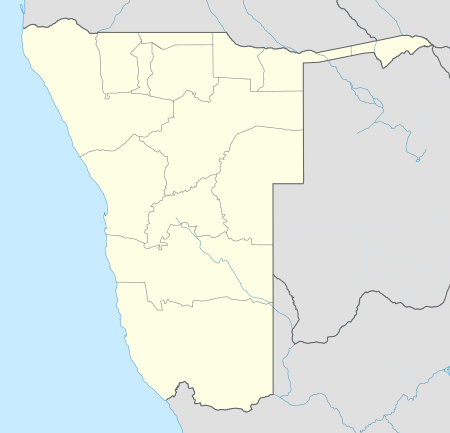Okongo
Okongo is a village in the Ohangwena Region of northern Namibia. It is situated about 120 kilometres (75 mi) east of Eenhana on the tarred road to Nkurenkuru.[1] It is the district capital of Okongo Constituency.
Okongo | |
|---|---|
Village | |
 Okongo | |
| Coordinates: 17°34′S 17°13′E | |
| Country | |
| Region | Ohangwena Region |
| Constituency | Okongo Constituency |
| Time zone | UTC+2 (SAST) |
| Climate | BSh |
History
Okongo was first settled by the San people in the 1900s, who, as a hunter-gatherer community, found the local abundance of wildlife and fruit attractive in the village. The name Okongo derives from the Oshiwambo word meaning: a place or a forest for hunting.
The San were eventually displaced in Okongo by the immigration of Bantu people. Today the commonly spoken language in the area is Oshiwambo and Christianity is the predominant religion.
Economy and infrastructure
Okongo has basic amenities: electricity, water and sanitation, a Post office, basic supermarkets and clothing outlets, as well as banking facilities. It also features a 62-bed public hospital that serves the surrounding settlements. There are two pre-primary schools, one primary school (Okongo Primary School), a combined school (Elia Weyulu Combined School) and a secondary school (Oshela Senior Secondary School).
The village is accessible via tarred road. There is also a landing strip for small aircraft.
The Women's Action for Development (WAD) group conducted a project aimed at skills transfer to local women. A total of about 120 unemployed women graduated from this program in 2010.[2]
Politics
Okongo is governed by a village council that has five seats.[3]
The 2015 local authority election was won by SWAPO which gained 881 votes and all five seats. The Rally for Democracy and Progress (RDP) and the Democratic Turnhalle Alliance (DTA) also ran and gained 60 and 29 votes, respectively.[4]
References
- "Okongo Map — Satellite Images of Okongo".
- "Unemployed Okongo Women Graduates". Namibia Economist. allafrica.com. 24 September 2010. Retrieved 6 April 2011.
- "Know Your Local Authority". Election Watch (3). Institute for Public Policy Research. 2015. p. 4.
- "Local elections results". Electoral Commission of Namibia. 28 November 2015. p. 5. Archived from the original on 10 December 2015.